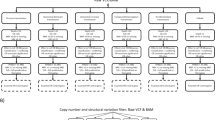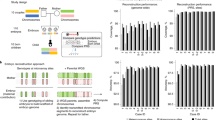Abstract
Hereditary tumor syndromes have garnered substantial attention due to their adverse effects on both the physical and psychological health of patients, as well as the elevated risk of transmission to subsequent generations. This has prompted a growing interest in exploring preimplantation genetic testing (PGT) as a treatment option to mitigate and eliminate these impacts. Several studies have demonstrated that de novo variants have become a great cause of many hereditary tumor syndromes, which introduce certain difficulties to PGT. In the absence of adequate genetic linkage information (parents and offspring), haplotype construction seems unrealizable. In the study, researchers used single sperm or affected embryos as proband to perform single-nucleotide polymorphism linkage analysis for cases with de novo variants. For complicated variants, the strategy that sperm combined with embryo detection will increase accuracy while avoiding the limitations and potential failures of using a single detection material. The study recruited 11 couples with male de novo carriers, including 3 tumor types and 4 genes. To date, 4 couples have been clinically confirmed as pregnant and three healthy babies have been born. The results of amniocentesis or umbilical cord blood verification were consistent with the results of PGT-M. The study aims to introduce the application of the PGT-M strategy in hereditary tumor syndromes.
This is a preview of subscription content, access via your institution
Access options
Subscribe to this journal
Receive 12 print issues and online access
$259.00 per year
only $21.58 per issue
Buy this article
- Purchase on Springer Link
- Instant access to full article PDF
Prices may be subject to local taxes which are calculated during checkout



Similar content being viewed by others
References
Garber JE, Offit K. Hereditary cancer predisposition syndromes. J Clin Oncol. 2005;23:276–92.
Boyd KP, Korf BR, Theos A. Neurofibromatosis type 1. J Am Acad Dermatol. 2009;61:1–14.
Brush SG. How theories became knowledge: Morgans chromosome theory of heredity in America and Britain. J Hist Biol. 2002;35:471–535.
van der Groep P, Bouter A, van der Zanden R, Siccama I, Menko FH, Gille JJ, et al. Distinction between hereditary and sporadic breast cancer on the basis of clinicopathological data. J Clin Pathol. 2006;59:611–7.
Jasperson KW, Tuohy TM, Neklason DW, Burt RW. Hereditary and familial colon cancer. Gastroenterology 2010;138:2044–58.
Motegi A, Masutani M, Yoshioka KI, Bessho T. Aberrations in DNA repair pathways in cancer and therapeutic significances. Semin Cancer Biol. 2019;58:29–46.
Kontomanolis EN, Koutras A, Syllaios A, Schizas D, Mastoraki A, Garmpis N, et al. Role of Oncogenes and Tumor-suppressor Genes in Carcinogenesis: A Review. Anticancer Res. 2020;40:6009–15.
Salviat F, Gauthier-Villars M, Carton M, Cassoux N, Lumbroso-Le Rouic L, Dehainault C, et al. Association Between Genotype and Phenotype in Consecutive Unrelated Individuals With Retinoblastoma. Jama Ophthalmol. 2020;138:843–50.
Sagi M, Weinberg N, Eilat A, Aizenman E, Werner M, Girsh E, et al. Preimplantation genetic diagnosis for BRCA1/2–a novel clinical experience. Prenat Diagn. 2009;29:508–13.
Kuliev A, Rechitsky S. Preimplantation genetic testing: current challenges and future prospects. Expert Rev Mol Diagn. 2017;17:1071–88.
Verlinsky Y, Rechitsky S, Verlinsky O, Xu K, Schattman G, Masciangelo C, et al. Preimplantation diagnosis for p53 tumour suppressor gene mutations. Reprod Biomed Online. 2001;2:102–5.
Ethics Committee of American Society for Reproductive M. Use of preimplantation genetic diagnosis for serious adult onset conditions: a committee opinion. Fertil Steril. 2013;100:54–7.
Acuna-Hidalgo R, Veltman JA, Hoischen A. New insights into the generation and role of de novo mutations in health and disease. Genome Biol. 2016;17:241.
Volikos E, Robinson J, Aittomaki K, Mecklin JP, Jarvinen H, Westerman AM, et al. LKB1 exonic and whole gene deletions are a common cause of Peutz-Jeghers syndrome. J Med Genet. 2006;43:e18.
Shi H, Niu W, Liu Y, Jin H, Song W, Shi S, et al. A novel monogenic preimplantation genetic testing strategy for sporadic polycystic kidney caused by de novo PKD1 mutation. Clin Genet. 2021;99:250–58.
Huang C, Zheng B, Chen L, Diao Z, Zhou J. The clinical application of single-sperm-based single-nucleotide polymorphism haplotyping for PGT of patients with genetic diseases. Reprod Biomed Online. 2022;44:63–71.
Chen D, Xiaoting X, Xu Y, Cai B, Ding C, Zhong Y, et al. Next-Generation Sequencing-Based Preimplantation Genetic Testing for De Novo NF1 Mutations. BioChip J. 2021;15:69–76.
McKeever K, Shepherd CW, Crawford H, Morrison PJ. An epidemiological, clinical and genetic survey of neurofibromatosis type 1 in children under sixteen years of age. Ulst Med J. 2008;77:160–3.
Asthagiri AR, Parry DM, Butman JA, Kim HJ, Tsilou ET, Zhuang Z, et al. Neurofibromatosis type 2. Lancet. 2009;373:1974–86.
Philpott C, Tovell H, Frayling IM, Cooper DN, Upadhyaya M. The NF1 somatic mutational landscape in sporadic human cancers. Hum Genomics. 2017;11:13.
Tamura R. Current Understanding of Neurofibromatosis Type 1, 2, and Schwannomatosis. Int J Mol Sci. 2021;22:5850.
Curatolo P, Bombardieri R, Jozwiak S. Tuberous sclerosis. Lancet. 2008;372:657–68.
Zhao HM, Yang YJ, Duan JQ, Ouyang HJ, Liu L, Yi LC, et al. Clinical and Genetic Study of Children With Peutz-Jeghers Syndrome Identifies a High Frequency of STK11 De Novo Mutation. J Pediatr Gastroenterol Nutr. 2019;68:199–206.
Fostira F, Mollaki V, Lypas G, Alexandrakis G, Christianakis E, Tzouvala M, et al. Genetic analysis and clinical description of Greek patients with Peutz-Jeghers syndrome: Creation of a National Registry. Cancer Genet. 2018;220:19–23.
Salussolia CL, Klonowska K, Kwiatkowski DJ, Sahin M. Genetic Etiologies, Diagnosis, and Treatment of Tuberous Sclerosis Complex. Annu Rev Genomics Hum Genet. 2019;20:217–40.
Zong C, Lu S, Chapman AR, Xie XS. Genome-wide detection of single-nucleotide and copy-number variations of a single human cell. Science. 2012;338:1622–6.
Yan L, Huang L, Xu L, Huang J, Ma F, Zhu X, et al. Live births after simultaneous avoidance of monogenic diseases and chromosome abnormality by next-generation sequencing with linkage analyses. Proc Natl Acad Sci USA. 2015;112:15964–9.
Yan Z, Zhu X, Wang Y, Nie Y, Guan S, Kuo Y, et al. scHaplotyper: haplotype construction and visualization for genetic diagnosis using single cell DNA sequencing data. BMC Bioinforma. 2020;21:41.
Vriesen N, Carmany EP, Natoli JL. Clinical outcomes of preimplantation genetic testing for hereditary cancer syndromes: A systematic review. Prenat Diagn. 2022;42:201–11.
Shenfield F, Pennings G, Devroey P, Sureau C, Tarlatzis B, Cohen J, et al. Taskforce 5: preimplantation genetic diagnosis. Hum Reprod. 2003;18:649–51.
Ren Y, Lian Y, Yan Z, Zhai F, Yang M, Zhu X, et al. Clinical application of an NGS-based method in the preimplantation genetic testing for Duchenne muscular dystrophy. J Assist Reprod Genet. 2021;38:1979–86.
Wang Y, Zhai F, Guan S, Yan Z, Zhu X, Kuo Y, et al. A comprehensive PGT-M strategy for ADPKD patients with de novo PKD1 mutations using affected embryo or gametes as proband. J Assist Reprod Genet. 2021;38:2425–34.
Shaulov T, Zhang L, Chung JT, Son WY, Buckett W, Ao A. Outcomes of Preimplantation Genetic Testing for Single Gene Defects in a Privately Funded Period and Publicly Funded Period: A North-American Single Center Experience. J Reprod Infertil. 2020;21:107–15.
Heijligers M, van Montfoort A, Meijer-Hoogeveen M, Broekmans F, Bouman K, Homminga I, et al. Perinatal follow-up of children born after preimplantation genetic diagnosis between 1995 and 2014. J Assist Reprod Genet. 2018;35:1995–2002.
Gulersen M, Peyser A, Ferraro A, Goldman R, Mullin C, Li X, et al. Maternal and neonatal outcomes in pregnancies conceived after preimplantation genetic testing. Prenat Diagn. 2021;41:835–42.
Huang L, Ma F, Chapman A, Lu S, Xie XS. Single-Cell Whole-Genome Amplification and Sequencing: Methodology and Applications. Annu Rev Genomics Hum Genet. 2015;16:79–102.
Mantere T, Kersten S, Hoischen A. Long-Read Sequencing Emerging in Medical Genetics. Front Genet. 2019;10:426.
Wu H, Chen D, Zhao Q, Shen X, Liao Y, Li P, et al. Long-read sequencing on the SMRT platform enables efficient haplotype linkage analysis in preimplantation genetic testing for beta-thalassemia. J Assist Reprod Genet. 2022;39:739–46.
Yanfei Cheng MM, Yu Q, Ma M, Wang H, Tian S, Zhang W, et al. Variant haplophasing by long-read sequencing: a new approach to preimplantation genetic testing workups. Fertil Steril. 2021;116:774–83.
Zhang S, Liang F, Lei C, Wu J, Fu J, Yang Q, et al. Long-read sequencing and haplotype linkage analysis enabled preimplantation genetic testing for patients carrying pathogenic inversions. J Med Genet. 2019;56:741–9.
Pei Z, Deng K, Lei C, Du D, Yu G, Sun X, et al. Identifying Balanced Chromosomal Translocations in Human Embryos by Oxford Nanopore Sequencing and Breakpoints Region Analysis. Front Genet. 2021;12:810900.
Watson CM, Holliday DL, Crinnion LA, Bonthron DT. Long-read nanopore DNA sequencing can resolve complex intragenic duplication/deletion variants, providing information to enable preimplantation genetic diagnosis. Prenat Diagn. 2022;42:226–32.
Tsuiko O, El Ayeb Y, Jatsenko T, Allemeersch J, Melotte C, Ding J, et al. Preclinical workup using long-read amplicon sequencing provides families with de novo pathogenic variants access to universal preimplantation genetic testing. Hum Reprod. 2023;38:511–9.
McCombie WR, McPherson JD, Mardis ER. Next-Generation Sequencing Technologies. Cold Spring Harb Perspect Med. 2019;9:a036798.
Quinn GP, Pal T, Murphy D, Vadaparampil ST, Kumar A. High-risk consumers' perceptions of preimplantation genetic diagnosis for hereditary cancers: a systematic review and meta-analysis. Genet Med. 2012;14:191–200.
Acknowledgements
This work was supported by National Key Research and Development Program (2019YFA0801401).
Author information
Authors and Affiliations
Contributions
All authors contributed to the study conception and design. Material preparation, data collection and analysis were performed by XC and YW. Other authors helped to collect follow-up clinical outcomes. The first draft of the manuscript was written by XC, YW and JQ. All authors commented on previous versions of the manuscript. All authors read and approved the final manuscript.
Corresponding author
Ethics declarations
Competing interests
The authors declare no competing interests.
Additional information
Publisher’s note Springer Nature remains neutral with regard to jurisdictional claims in published maps and institutional affiliations.
Rights and permissions
Springer Nature or its licensor (e.g. a society or other partner) holds exclusive rights to this article under a publishing agreement with the author(s) or other rightsholder(s); author self-archiving of the accepted manuscript version of this article is solely governed by the terms of such publishing agreement and applicable law.
About this article
Cite this article
Chen, X., Wang, Y., Guan, S. et al. Application of the PGT-M strategy using single sperm and/or affected embryos as probands for linkage analysis in males with hereditary tumor syndromes without family history. J Hum Genet 68, 813–821 (2023). https://doi.org/10.1038/s10038-023-01188-4
Received:
Revised:
Accepted:
Published:
Issue Date:
DOI: https://doi.org/10.1038/s10038-023-01188-4



